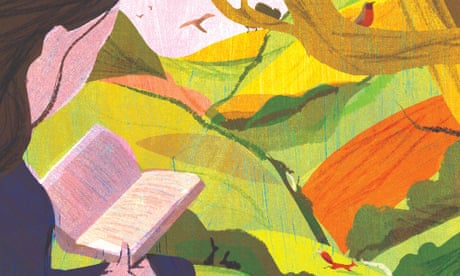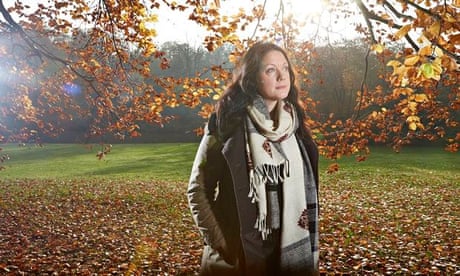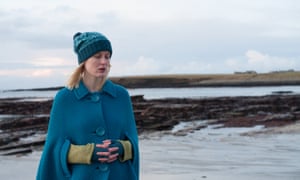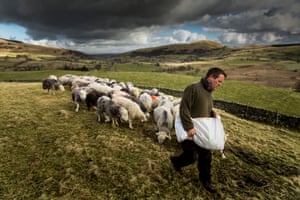'In stressed times, we can take comfort in wildlife': why nature-writing is 'exploding'
The shortlist for the Wainwright nature-writing prize’s third year is
announced as bookshops report dramatic rise in the genre’s sales.
Shepherd James Rebanks, who is also the author of bestseller The
Shepherd’s Life, pictured working on his farm at Matterdale End in
Cumbria.
Photograph: Christopher Thomond for the Guardian
Alison Flood
Thursday 30 June 2016 09.00 BST Last modified on Thursday 30 June 2016 09.01 BST
Now in its third year, the Wainwright nature-writing prize has announced its shortlist, spotlighting what one judge called an “exploding” field, as more and more writers and readers are turning to this genre as a balm for the woes of modern life.
The contenders range from James Rebanks’s The Shepherd’s Life, a firsthand account of a way of life that has endured in the Lake District for centuries, to Amy Liptrot’s acclaimed memoir about her return to the wilds of Orkney, The Outrun. Dame Fiona Reynolds, who has been chair of judges for the Wainwright prize since 2014, said that “what is coming out [in the genre] is remarkable new writing”, as the titles join a busy corner of the books market, where recent hits have include Helen Macdonald’s memoir of grief and falconry, H is for Hawk and last year’s Wainwright prize winner, John Lewis-Stempel’s Meadowland.

Country files: nature writers on the books that inspired them
“It does seem to be exploding,” said Bill Lyons, executive producer of Coast and Countryfile, and a Wainwright judge. “And it’s exploded in many different directions - there’s the traditional offering, which simply shows an admirable and wonderful expertise in natural history and wildlife in its own right. Then there are writers who are delineating a particular territory. Whether that’s simply writing about marshland, or mountains, these people are plotting out particular patches of the natural world. And then there’s the latest development, which I find most interesting: we’re seeing an explosion of natural history writing as meditation, as a sort of healing process, using the landscape as a way of reflecting, often on childhood trauma, and using it as a way to heal.”
Reynolds, who has previously run the National Trust and the Council for the Protection of Rural England, agreed: “Even in these three years there has been an absolute flood of books in which writers are talking about nature and its meaning, and not just in a superficial sense. These are profound books, about a deep relationship and about the deeply spiritual questions which confront us in society.” “[They show us that] there’s more to life than the economy, or foreign policy – these writers are articulating beautifully the ways in which the human spirit needs to connect with the world around us, and to respect the world around us.”

Helen Macdonald: ‘I was feral, I identified with the hawk, took on her character’
Figures from book sales monitor Nielsen Book show that sales in the “animal and wildlife” category have increased dramatically, from 426,630 books in 2012, to 663,575 books in 2015. The Shepherd’s Life has sold more than 160,000 copies to date, while H is for Hawk’s sales top 250,000.
Advertisement
Reynolds revealed the six-strong shortlist for the £5,000 Wainwright prize on Thursday morning. Launched by publisher Frances Lincoln in association with the National Trust, the award goes to the title that best reflects the values of fell walker and guidebook author Alfred Wainwright “of inspiring people to explore the outdoors, whilst engendering a love of landscape and respect for nature”.
Along with The Shepherd’s Life and The Outrun, the lineup this year also includes Robert Macfarlane’s meditation on words and landscape, Landmarks; Rob Cowen’s exploration of a square mile of woodland in Yorkshire, Common Ground; Katharine Norbury’s account of walking along Britain’s rivers, The Fish Ladder; and Michael McCarthy’s memoir of childhood trauma and defence of threatened nature, The Moth Snowstorm. The winner will be announced on 5 August.
“There is a definite sense in which we are going through a period of tumultuous change, even before the vote last week,” said Reynolds. “Our landscape has never been more challenged by change and in very different ways these books remind us of the important role the natural world plays in our personal lives. Each book here provides a unique and uplifting discovery of some aspect or part of the UK, while gifting us with profound and moving experiences.”
Lyons agreed, saying that the popularity of the genre “is speaking to the time we live in – so many people lived stressed-out lives. We’re living in a public world of private troubles which we find difficult to share … we can take comfort in wildlife and landscape.”

Amy Liptrot, author of The Outrun, pictured in Orkney. Photograph: Rebecca Marr for the Observer
At Waterstones, nonfiction buyer Bea Carvalho said the bookseller had “seen a real surge in the popularity of nature writing in the last couple of years”. She cited The Shepherd’s Life, in which Rebanks writes of a year in his life as a shepherd and how “you could bring a Viking man to stand on our fell with me and he would understand what we were doing and the basic pattern of our farming year”, as Waterstones’ “greatest hit” from the genre so far this year, along with Lewis-Stempel’s The Running Hare, Charles Foster’s Being a Beast, and Tristan Gooley’s “brilliant books on how to interpret one’s surroundings”, How to Read Water and Walker’s Guide to Outdoor Clues and Signs.
“Nature writing is a genre which lends itself well to thoughtful, creative writing and beautiful design – a winning combination for grabbing and holding on to people’s attention – and can offer escapism or the welcome chance to take notice of our surroundings and see our world through a different, more positive lens,” she said. “New publishing in the genre continues to be extremely strong and we’re looking forward to seeing what publishers have in store for 2017.”
Link: https://www.theguardian.com/books/2016/jun/30/in-stressed-times-we-can-take-comfort-in-wildlife-why-nature-writing-is-exploding
The Wainwright shortlist in full:
Common Ground by Rob Cowen (Windmill)The Outrun by Amy Liptrot (Canongate)
Landmarks by Robert Macfarlane (Penguin)
The Moth Snowstorm by Michael McCarthy (John Murray)
The Fish Ladder by Katharine Norbury (Bloomsbury)
The Shepherd’s Life by James Rebanks (Penguin)

No comments:
Post a Comment